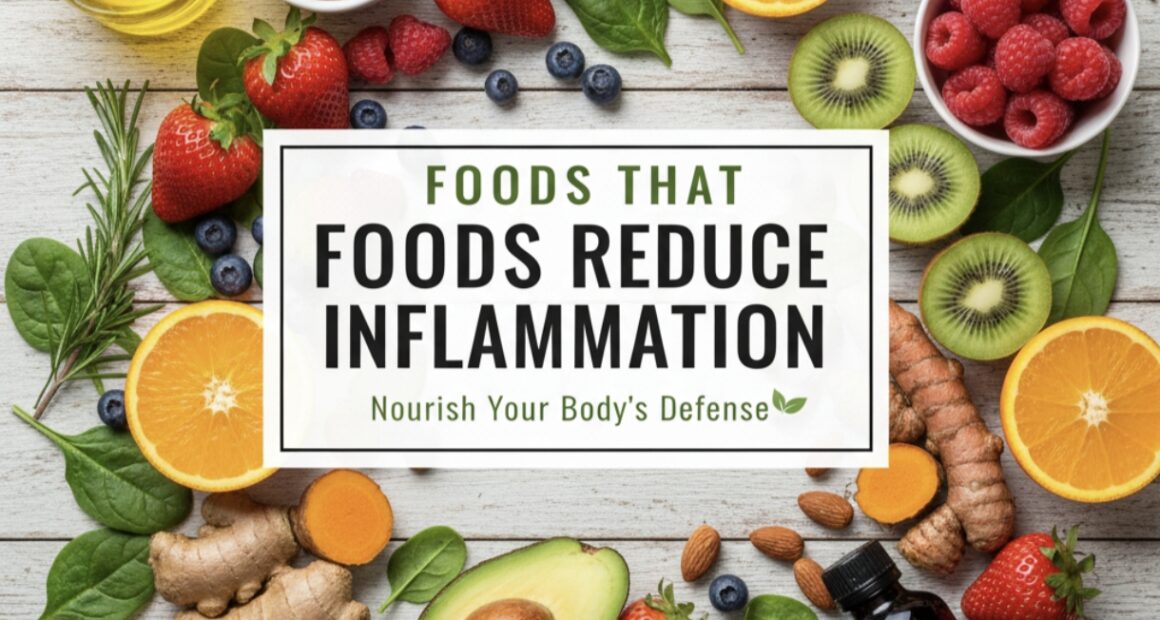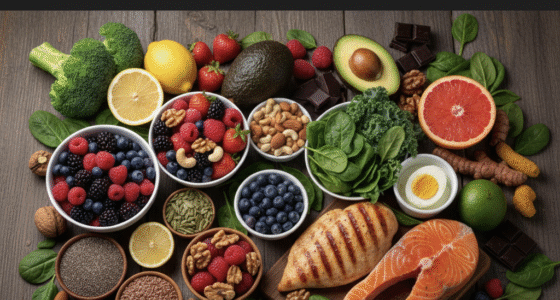Foods That Reduce Inflammation
Chronic inflammation is linked to a wide range of health problems, including heart disease, diabetes, arthritis, and autoimmune conditions. While inflammation is a natural immune response to injury or infection, persistent inflammation can silently damage your body over time. The good news is that certain foods have powerful anti-inflammatory properties and can help your body fight chronic inflammation naturally.
Understanding Inflammation
Inflammation is your body’s way of protecting itself from harmful stimuli. Acute inflammation is short-term and helps heal injuries or infections. Chronic inflammation, however, can occur when the body is under constant stress, poor diet, or exposure to environmental toxins. Over time, this type of inflammation can damage tissues and organs, increasing the risk of disease. Choosing anti-inflammatory foods is an effective way to prevent long-term health issues.
Top Anti-Inflammatory Foods
1. Fatty Fish
Fatty fish such as salmon, mackerel, sardines, and tuna are excellent sources of omega-3 fatty acids. Omega-3s are known to reduce inflammatory markers in the blood and support heart health. Including at least two servings of fatty fish per week can significantly lower inflammation and improve overall well-being.
2. Leafy Greens
Leafy vegetables like spinach, kale, Swiss chard, and collard greens are packed with antioxidants, vitamins, and minerals that combat inflammation. These vegetables are also high in fiber, which supports healthy digestion and stabilizes blood sugar levels, further reducing inflammation risk.
3. Berries
Blueberries, strawberries, raspberries, and blackberries are rich in anthocyanins, flavonoids with potent anti-inflammatory effects. Eating berries regularly helps lower oxidative stress in the body, protecting tissues from chronic damage.
4. Nuts and Seeds
Almonds, walnuts, chia seeds, and flaxseeds provide healthy fats, fiber, and antioxidants. These nutrients reduce inflammation and improve cardiovascular health. A small handful of nuts daily can be a simple and effective anti-inflammatory habit.
5. Olive Oil
Extra virgin olive oil contains monounsaturated fats and polyphenols that have strong anti-inflammatory properties. Using olive oil as a main cooking fat or in salads can help reduce inflammatory markers in your body.
6. Turmeric
Turmeric contains curcumin, a powerful anti-inflammatory compound. Adding turmeric to your cooking, smoothies, or golden milk can help reduce inflammation naturally. Pairing it with black pepper enhances curcumin absorption.
7. Green Tea
Green tea is rich in catechins, antioxidants that protect cells and reduce inflammation. Drinking 2–3 cups of green tea daily can help reduce chronic inflammation and support heart and brain health.
8. Tomatoes
Tomatoes are high in lycopene, an antioxidant that helps lower inflammation in the body. Cooking tomatoes increases the bioavailability of lycopene, making dishes like tomato sauces particularly beneficial.
Foods to Limit
Alongside anti-inflammatory foods, it’s important to reduce pro-inflammatory foods in your diet. These include:
- Processed and fried foods
- Sugary beverages and snacks
- Refined grains and pastries
- Red and processed meats
- Excessive alcohol
Additional Lifestyle Tips
- Exercise regularly to help control inflammation and maintain a healthy weight.
- Manage stress with meditation, yoga, or deep breathing techniques.
- Get adequate sleep each night to allow the body to repair and reduce inflammatory responses.
- Stay hydrated to support detoxification and overall health.
Conclusion
Incorporating anti-inflammatory foods into your daily diet can help prevent chronic inflammation and reduce the risk of serious health conditions. Focus on whole, nutrient-rich foods like fatty fish, leafy greens, berries, nuts, olive oil, and herbs such as turmeric. Combine this with a healthy lifestyle including exercise, stress management, and proper sleep to maximize the benefits. Small, consistent changes can lead to long-lasting improvements in your health and overall well-being.








